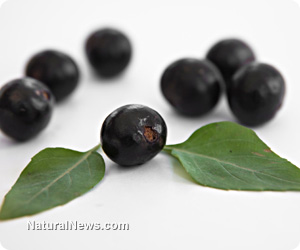 |
|
Learn more: http://www.naturalnews.com/044362_acai_berries_weight_loss_antioxidants.html#ixzz2wTx2dpdh
(NaturalNews) Acai berries are the fruits of the acai palm, a species of palm tree native to Central and South America. These berries, which are characterized by their grape-like appearance and bitter taste, have been cherished by the Amazonian natives for centuries due to their incredible medicinal properties. These properties, which are slowly being validated by ongoing studies, are the reason why acai berries - along with other Amazonian foods such as cacao, maca and camu camu - have become synonymous with the "superfood" label.
Research into acai berries
Rich in antioxidants - According to a study published in the June 2008 issue of the Journal of Agricultural and Food Chemistry, acai berries contain a large number of antioxidants that help scavenge cell-damaging free radicals from the body. In particular, the study, which was conducted by researchers at the Department of Nutrition and Food Science at Texas A&M University, showed that acai berries possessed the highest antioxidant activity to date against a certain type of free radical, making them an excellent guard against degenerative diseases such as macular degeneration and Alzheimer's disease. Antioxidant-rich foods like acai berries have also been linked to improved cardiovascular health, improved skin and eye health, anti-aging benefits and more.Anti-cancer properties - A study by researchers at the University of Florida has shown that acai berry extracts can help kill leukemia cells when applied directly to them over a 24-hour period. Specifically, 86 percent of leukemia cells experienced apoptosis ("cell death") when subjected to the extract; the researchers attributed this effect to acai berries' high concentrations of anthocyanins, a type of flavonoid that gives the fruits their distinctive, black-purple color. The study was published in the January 2006 issue of the Journal of Agricultural and Food Chemistry.
Immune-boosting properties - Acai berries contain a polysaccharide called arabinogalactan that is known to induce T cell activity, thereby helping the body fight infections. According to researchers at the Department of Immunology and Infectious Diseases at Montana State University, these components in acai berries "have implications for the treatment of asthma and infectious disease."
Weight loss - Though no serious studies have been conducted on acai berries' alleged weight loss properties, anecdotal evidence persists. This is probably because a 100 gram serving of acai berries contains 2 grams of dietary fiber (8 percent of our RDI) and negligible amounts of fat and calories. Aside from sweeping the intestinal tract of accumulated matter, fiber helps to absorb water in the colon, promoting a feeling of fullness that discourages eating. Moreover, acai berries' energy-boosting properties can improve the length and quality of our exercise regimes.
Discerning acai products
Ever since the benefits of acai berries became well-known in the West, the natural health market has exploded with a wide range of acai products - including some rather questionable ones. The best way to decide whether an acai product is high quality (and ethically sourced) or not is to check whether it is1.) certified organic, and
2.) wildcrafted, meaning it has been harvested in its native state in South America. Products that meet both these criteria can be purchased with confidence.
Sources for this article include:
http://pubs.acs.org/doi/abs/10.1021/jf800161u
http://news.ufl.edu/2006/01/12/berries/
http://science.naturalnews.com
http://science.naturalnews.com/Acai.html
No comments:
Post a Comment